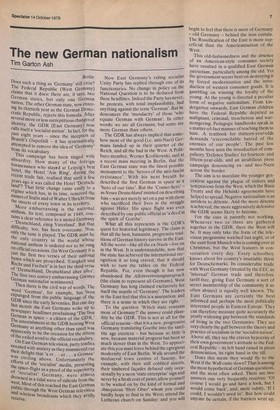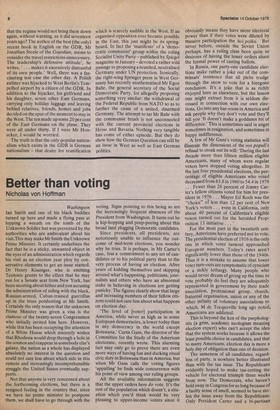The new German nationalism
Tim Garton Ash
Berlin Does such a thing as 'Germany' still exist? The Federal Republic (West Germany) claims that it does: there are, it says, two German states, but only one German nation. The other German state, now entering its thirtieth year as the German Democratic Republic, rejects this formula. After several more or less surreptitious changes of identity, the GDR (East Germany) now calls itself a 'socialist nation'. In fact, for the past eight years — since the inception of Brandt's Ostpolitik — it has systematically attempted to remove the idea of 'Germany' from its vocabulary. This campaign has been tinged with absurdity. How many of the foreign businessmen who stayed at Leipzig's best hotel, the Hotel 'Am Ring', during the recent trade fair, realised that until a few years ago it was called the Hotel Deutschland'? That little change came easily to a regime which has, in its time, removed the names of Stalin and of Walter Ulbricht from the streets of every town in its territory. More embarrassing is the national anthem. Its text, composed in 1949, contains a clear reference to a united Germany —`Deutschland, einig Vaterland'. But that difficulty, too, has been overcome. Now only the tune is played, The GDR must be the only country in the world whose national anthem is ordered not to be sung o n official occasions. (In West Germany It is just the first two verses of their national hymn which are proscribed. Einigkeit und Recht und Freiheit' is in fact the third verse Of 'Deutschland, Deutschland iiber alles . The first two convey embarrassing Greater German nationalist sentiments). Then there is the civil war of words. The word 'German', for example, has been expunged from the public language of the GDR since the early Seventies. But one day last month the East Germans woke up. to newspaper headlines proclaiming 'The first German in space — a citizen of the GDR.' The astonishment at the GDR beating West Germany at anything other than sport was apparently to be the occasion for the return of the exiled word to the official vocabulary. On East German television, party toadies sweated with anxiety as they stammered out their delight that 'a er . .er. . . a German' was circling above. Unfortunately the efforts of the 'socialist' media, presenting the space-flight as a proof of the superiority of socialist' Germany, were almost drowned in a tidal wave of ridicule from the west. Most of this reached the East German public through the West German television and wireless broadcasts which they avidly receive. Now East Germany's ruling socialist Unity Party has replied through one of its functionaries. No change in policy on the National Question is to be deduced from these headlines. Indeed the Party has never, he protests, with total implausibility, had anything against the term 'German'. But he denounces the 'mendacity' of those 'who equate German with German'. In other words: we are all Germans, but some are more German than others.
The GDR has always implied that somehow most of the good (i.e. anti-Nazi) Ger mans landed up in their quarter of the Reich, and all the bad in the West. A Politburo member, Werner Krolikowski, said at a recent mass meeting in Berlin, that the East German state was the finest possible monument to the 'heroes of the anti-fascist resistance'. With his next breath he described the first German in space as a 'hero of our time'. But the 'Cosmo-hero' — as Neues Deutschland insisted on describing him — was not merely set on a par with those who sacrificed their lives in the struggle against Hitler. His space flight was even described by one public official as 'a deed in the spirit of Goethe'. What all this represents is the GDR's quest for historical legitimacy. The claim is that all the best, humanist, progressive traditions of German history survive in the East. All the worst — like all the ex-Nazis— live on in the West. It is understandable, now that the state has achieved the international recognition it so long craved, that it should wish to turn the tables on the Federal Republic. For, even though it has now abandoned the Alleinvertretungsanspruch (the claim to represent all Germans), West Germany has long claimed exclusively for itself the mantle of 'Germany'. The leaders in the East feel that this is a usurpation, and there is a sense in which they are right. To the question 'Which state contains more of Germany?' the answer could plausibly be the GDR. This is not at all for the official reasons—that it is a new, progressive Germany translating Goethe into the satellite age etcetera — but because so little is new, because material progress has been so much slower than in the West. To appreciate this you must leave behind the egregious modernity of East Berlin. Walk around the mediaeval town centres of Saxony, for example, with their still cobbled streets, their timbered façades defaced only occasionally by a neon 'state enterprise' sign and never by a fresh coat of paint; allow yourself to be waited on by the kind of formal and pbsequious 'Herr Ober' whom you could hardly hope to find in the West; attend the Lutheran church on Sunday: and you will begin to feel that there is more of Germany — old Germany — behind the iron curtain.
The Russification of the East is more superficial than the Americanisation of the West.
This old-fashionedness and the absence of an American-style consumer society have resulted in a qualified East German patriotism, particularly among the old: Yet the government seems bent on destroying it by forced modernisation and the intro duction of western consumer goods. It is gambling on winning the loyalty of the young. At the young is directed a peculiar form of negative nationalism. From kin dergarten onwards, East German children have the Federal Republic depicted as malignant, criminal, treacherous and war mongering. Pedagogic handbooks speak in a matter-of-fact manner of teaching them to hate. A textbook for thirteen-year-olds demands 'irreconcilable hatred of the enemies of our people'. The past few months have seen the introduction of compulsory 'Defence Studies' for fourteenand fifteen-year-olds, and an atrabilious press campaign denouncing exand neo-Nazis across the border.
The aim is to inoculate the younger generation against the plague of visitors and temptations from the West, which the Basic Treaty and the Helsinki agreements have helped to spread. Negative nationalism is an antidote to détente. And the more détente is achieved, the more aggressively defensive the GDR seems likely to become.
For the cure is patently not working. Whenever two or three are gathered together in the GDR, there the West will be. It may only take the form of the television programme watched last night, or of the aunt from Munich who is coming over at Christmas, but the West features in conversation every day. Every schoolboy knows about his country's insatiable thirst for Deutschemarks. Its considerable trade with West Germany (treated by the EEC as 'internal' German trade and therefore tariff-free, giving East Germany a sort of secret membership of the community it so often abuses) is equally well known. The East Germans are certainly the best informed and perhaps the most politically interested people in Eastern Europe. They can therefore measure quite accurately the yearly widening gap between the standards of living in the two Germanies. They see very clearly the gulf between the theory and practice of socialism in the 'socialist nation'. Above all, they see the craven hypocrisy of their own government's attitude to the Federal Republic — its left hand raised in pious denunciation, its right hand in the till.
Does this mean they would fly to the West if the Wall came down? That is among the most hypothetical of German questions, and the most often asked. There are two answers one very frequently receives: 'Of course I would go and have a look, but I would come back', and, more subtly, `If I could, I wouldn't need to'. But how could anyone be certain, if the barriers went up, that the regime would not bring them down again, without warning, as it did seventeen years ago? The author of the best (the only) recent book in English on the GDR, Mr Jonathan Steele of the Guardian, seems to consider the travel restrictions unnecessary. The leadership's defensive attitude', he writes, . . . makes it excessively distrustful' of its own people.' Well, there was a fascinating test case the other day. A Polish airliner was hijacked to West Berlin's Ternpelhof airport by a citizen of the GDR. In addition to the hijacker, his girlfriend and his daughter, seven other East Germans, carrying only holiday luggage and leaving behind relatives, friends, homes and jobs decided on the spur of the moment to stay in the West. The ten made up some 20 per cent of the East Germans on the plane. They were all under thirty. If I were Mr Honecker, I would be worried.
The truth is that the only popular nationalism which exists in the GDR is German nationalism — that desire for reunification which is scarcely audible in the West. If an organised opposition ever became possible in the East, this just might be its springboard. In fact the 'manifesto' of a 'demo-cratic communist' group within the ruling Socialist Unity Party — published by Spiegel magazine in January—devoted a rather wild passage to proposing a reunited, neutralised Germany under UN protection. Ironically, the right-wing Springer press in West Germany has recently anathematised Mr Egon Bahr, the general secretary of the Social Democratic Party, for allegedly proposing something very similar: the withdrawal of the Federal Republic from NATO so as to further the cause of a united, disarmed Germany. The attempt to tar Mr Bahr with the communist brush is not unconnected with the current provincial elections in Hesse and Bavaria. Nothing very tangible has come of either episode. But they do show how the German Question can still be an issue in West as well as East German politics.



































 Previous page
Previous page